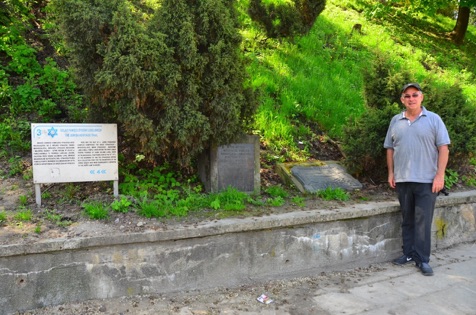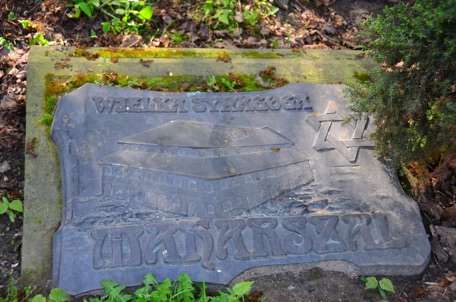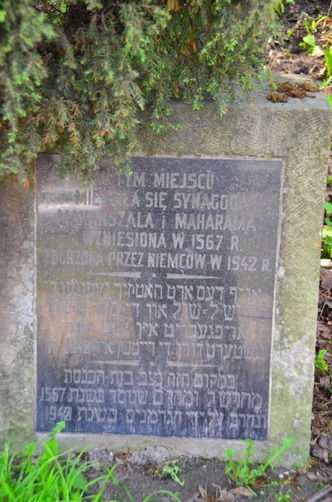Lublin, Poland
Solomon Luria
From Wikipedia, the free encyclopedia
Solomon Luria (1510 – November 7, 1573) (Hebrew: שלמה לוריא) was one of the great Ashkenazic poskim (decisors of Jewish law) and teachers of his time. He is known for his work of Halakha, Yam Shel Shlomo, and his Talmudic commentary Chochmat Shlomo. Luria is also referred to as Maharshal מהרש"ל (Hebrew abbreviation: Our Teacher, Rabbi Solomon Luria), or Rashal רש"ל (Rabbi Solomon Luria).
Biography
Luria was born in Posen. His father, Yechiel Luria, was the rabbi of the Lithuanian city of Slutzk and the son of the eminent Talmudist Miriam Luria. The Luria family claims descent from Rashi.[1] Luria studied in Lublin under Rabbi Shalom Shachna, and later in the Ostroh yeshiva under Kalonymus Haberkasten; he later married Lipka, daughter of Rabbi Kalonymus. Students in the yeshiva included Joshua Falk. The Maharshal served as Rabbi in Brisk and various Lithuanian communities for 15 years.
When Haberkasten assumed the position of rosh yeshiva in Brisk, Luria replaced him as the official rabbi of the city and region of Ostroh. Luria later succeeded Shalom Shachna as head of the famed Lublin Yeshiva, which attracted students from all over Europe. Due to various internal problems in the yeshiva, he opened his own yeshiva. The building, known as the "Maharshal's shul", remained intact until World War II.
Methodology
"Luria rejected contemporary talmudic and legal methodology. He dismissed the then current belief that legal opinions of earlier generations were almost sacrosanct. Luria maintained that his generation had just as equal access to knowledge as those that came before it. Luria believed that it was incumbant upon scholars in each generation to comb the sources from their talmudic beginnings through the tosafists to their own day, analyzing and weighing each matter and all opinions before coming to a well-considered conclusion. To draw legal conclusions on the basis of a simple majority among three leading medieval authorities as Joseph Karo had done in his sixteenth century code of Jewish law, the Shulhan 'aruk, was, in Luria's opinion, simply wrong. Unlike his contemporaries, Luria was unfettered by the weight of medieval halakic traditions and had the independence and boldness of character to overturn almost any opinion in his passionate search for truth."[2]
Works
Yam Shel Shlomo, Luria's major work of Halakha, was written on sixteen tractates of the Talmud; however, it is extant on only seven. In it, Maharshal analyzes key sugyot (passages) and decides between various authorities as to the practical halacha. Maharshal, famously, objected to Isserles's method of presenting halakhic rulings without discussing their derivation. He wrote Yam Shel Shlomo to "probe the depths of the halacha" and to clarify the process by which those halachot are reached.
Chochmat Shlomo is a gloss, and comments, on the text of the Talmud. One function of this work is to correct textual errors. In establishing the correct text Maharshal scrutinized the published editions of the Talmud as well as the commentaries of Rashi, Tosafot, and other Rishonim. His comments were later published by his son; an abridged version of Chochmat Shlomo appears in nearly all editions of the Talmud today, at the end of each tractate. The original, separately printed version, is far more extensive, and has now been re-published in the Metivta/Oz ve-Hadar edition of the Talmud. The Chida writes that "I've heard from elders, that the Maharshal is extremely deep; and most hasagot from the Maharsha on the Maharshal, aren't hasagot if the reader will delve deep into the subject".
Maharshal also wrote:
-
•Yeri'ot Shlomo, a super-commentary on Rashi's commentary on the Torah (in fact a commentary on Elijah Mizrachi's supercommentary on Rashi) - HebrewBooks.org;
-
•Amudei Shlomo, a commentary on Sefer Mitzvot Gadol ("SeMag") of Rabbi Moses ben Jacob of Coucy;
-
•A collection of Responsa; see History of Responsa: Sixteenth century.
See also
-
•Elijah Ba'al Shem of Chelm - one of his famous students who, according to legend, could create a golem creature.
-
•Moshe ben Avraham - one of his students, author of the Mateh Moshe
External links
-
•Rabbi Solomon Luria, the Maharshal, ou.org
-
•Solomon b. Jehiel Luria, jewishencyclopedia.com






